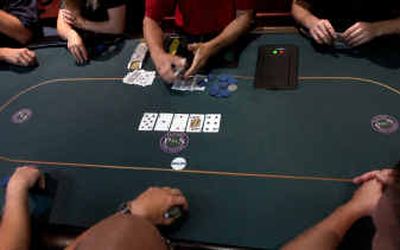It’s all in the cards

Vince Brazier’s luck disappeared in a flash and by 11 a.m. he had busted. His hand, two pair with aces and jacks, was beat by three 7s. The loss was a “bad beat” any way you look at it. Brazier took his Friday morning loss in stride, having cleaned up at the table several days earlier.
“I won $300 in a three-man game in the daily final. It was actually $304, but who’s counting?” Brazier recalled with a grin.
The Travel Channel’s World Poker Tour and ESPN’s World Series of Poker — shows that televise world-class poker tournaments featuring top players competing for millions of dollars in prize money — have touched off a real-life poker craze that’s reinvigorated card rooms.
Managers of local casinos say the programs have taught viewers the game and that’s brought a new group — including women and younger players — to the table.
“They didn’t have an understanding of how it works and they were intimidated. Now that they’ve seen this on TV, they’re coming to understand that this is pretty simple and it’s better odds in their favor than other types of games,” said Scott Letsch, casino manager for Players and Spectators in the Spokane Valley. He estimates that the shows have doubled the demand for poker.
Five card rooms currently operate in Spokane and Spokane Valley and three new businesses have applications for gaming permits pending with the Washington State Gambling Commission.
Texas Hold ‘Em is starting to put the squeeze on blackjack — the traditional darling of card games — as casino owners convert some of the 15 tables they are licensed to operate into poker tables.
Casinos are starting to offer a mix of limit betting and tournaments.
Players and Spectators hosts Texas Hold ‘Em tournaments two times a day for a $10 buy-in fee. Players who run out of chips can buy back in for additional increments of $10 each during the first four rounds of play. Participants compete to win a seat at the semifinals, which qualify a handful of players for the big money tournament at the end of the month.
Last month’s prize pool was just under $20,000 with the first place winner walking away with $7,200.
Since converting four gaming tables to poker last February, Big Daddy’s on Spokane’s South Hill has drawn a regular crowd at its daily afternoon tournaments, said Bill Varner, card room manager.
“We were really amazed at the level of business. It’s not unusual to get 50 people up here during the day wanting to play,” said Varner, who notices that players like talking about the game nearly as much as they like playing it.
“People like to talk about what they call bad beats. That’s the number one topic,” Varner said.
Bob Romelow, an owner of Classic Rock Casino at Lilac Lanes in North Spokane, plans to convert three of the casino’s 15 gaming tables to poker, this fall. “Everybody that watches the World Series of Poker believes that they can become a poker player—it’s pretty hot.”
For anyone who hasn’t caught the latest in television gambling, Texas Hold ‘Em isn’t your typical know when to hold them and know when to fold them kind of game.
Up to nine people at a time can play Texas Hold ‘Em. Players are each dealt two cards. They combine their two cards with five additional cards that are dealt in two rounds, face up, in the center of the table. The strategy lies in the rounds of betting that are layered within the game and the best five-card hand wins.
With everyone playing off the same cards, guessing who might have the winning hand should be easy, but the game is about as predictable as a spring hail storm, and shakeups are common. Bluffing, a mysterious art that is mastered by some and boggled by many, comes into play when stakes are high and someone could theoretically attempt to buy the pot.
However, when strangers are thrown into the mix, it’s hard to judge if a person’s manic finger tapping is bluffing or just an annoying distraction.
Corey Davis, a 22-year-old player and casino employee, is learning the art of the bluff after tipping off numerous opponents to his hand. “When I first started playing, everyone could tell I had a good hand because I’d be smiling.”
Davis, who plays each week with a group of buddies, avoids the temptation to overspend his budget by limiting the amount of cash that he brings to the casino, a technique players use to avoid the impulsive betting that can get gamblers into trouble.
“When you sit down with the older guys they have a lot more money than us younger guys. They like to raise it.” Davis said. “I don’t want to lose all my money, I’m a poor college student.”
Dan Rose, 28, is trying his hand at professional card playing. “You’ve got to start somewhere. You’re not going to live forever, so you might as well do what you want,” said Rose, who admits that the first two months have been tough financially.
Lynn Nehlich, a pit boss at Players and Spectators, has been part of the local card scene for 28 years.
“I actually made a living at poker and would go four or five years without doing anything else. It’s possible and there are four or five guys in town doing this right now.”
While it’s possible to make a living playing poker, Nehlich doesn’t favor the odds.
One downfall to professional card playing, according to Nehlich, is that players who are attracted to the mystique of the game often lack self-discipline and think professional perks include sleeping all day and partying at the tables at night.
The end result can be a quick painful lesson and a move back to Spokane.
“I know several people who quit their jobs and had to go back to work.”